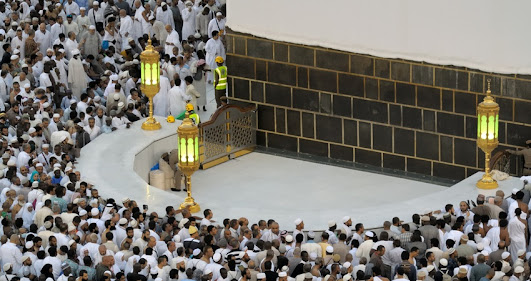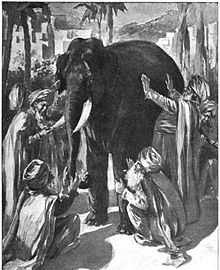The Punjab in the Indian Subcontinent has been the entry point to India for invaders, discovers, merchants, and travellers for mellinia. Thus it became a receptacle of very diverse ideas, philosophies, and ways of life over histroy. Muslim missionaries travelled there and beyond to teach people about the natural way of life, through personal example and righteous living. People from all communities were influenced by these teachers who they elevated to status higher than perhaps was appropriate, as is the case with such matters in the Indian subcontinent, where there has always been a tendency to exaggerate in respect and devotion to teachers raising them to semi-divine status.
Today, we find the masses of all faith communities, going on pilgrimage to the graves of such teachers who are raised to the status of "saints". Many circummbulate these graves in devotion or prostrate to them or supplicate them for their needs. This has been the culture of the Indian Subcontinent, regardless of the faith community, as first described by Al Biruni in his antropological work on Indian society.
In the last millenia, the confluence of different faiths in the Punjab developed and intermingled, as the tendency of Hinduism which as been the main cultural force there is to amalgamate different faith and phiolosphies in a single all absorbing culture. This resulted in a common sense of spirtuality with ascetics from both Hindu and Muslim traditions practicing self denial and personal spirtual development, Just like the rivers of Punjab intermingle and flow into the Arabian Sea contibuting their essence in the discharge, likewise the different philospohies of this ferile land intermingled and developed into a common sense of spirituality with Sufi/Bhagti (personal spiritual development based on devotional remembrance of God which makes the devotee esctatic and reach haal -- causes them to "go in the zone").
Sikhism developed over several centuries based on the teaching of its primary (first) teacher, Guru Nanak, in the 1400s. As a deeply spirutal person, he went on a self discovery journey spiritually as well as physcially to understand and explain the sprituality he personally got insights about. He did not claim to be a prophet of God, nor was his insights Revelation like they were for the Messengers of God in history. Nevertheless, he was a spiritual man, devotred to worshiping the One God from whom he got insights just like good upright men do. Thus he learned a personal way of living with many positive aspects and started teaching it to others.
Some of the ideas that were important for him was the devotional personal connection with the One God, who represented the Truth. Through spritual practices akin to the Sufi/Bhagti tradition, and clean living, his inspirations and insights increased. With good intentions and mission for public service, they built upon each other. As a traveler and devoted man, he learned from many socieites and laid a lot of emphasis on learning, which became the basis of this new religion -- Sikh i.e. a disciple who is engrossed in learning.
Guru Nanak taught his disciples and chose the one he taught was best qualified to continue that teaching to others, thus his best disciple became the second Guru, and the line of gurus contined likewise till the 1700s. The gurus recorded these teachings and their personal phiolosophies in poems and books, which ultimately was completed and compiled by the 10th and last guru, Guru Gobind Singh. Rahter than choosing a suceesor to take over the task of teaching the community after him, this book of personal reflections of whole line of 10 gurus became the means of guidance for the Sikh community.
Although, it is just a book of personal reflections of inspired people, the Granth Sahab is not the words of God, per se, nor are the words of prophets as none of the gurus were more than the wise inspired people. None claimed to be more than that. It contains the way Guru Nanak and the 9 gurus after him were inspired and lived a life which was meaningful for them, so that others who wish to do so might study it and try the same at a personal and community level based on the principles they had outlined in their personal reflections.
Today, the Grarnth Sahab is given the status of a living person, Guru Granth Sahab, as the book is called in a living teacher like the other 10 gurus were once living. When devotees enter their places of worship, they prostrate to the book, and show devotion and reverance to it, whereas it might have orignially be intended just as a respository to principles to be studies, reflected, and applied to live a "good life" that the gurus intended their community to live.
As compared to Islam -- the natural way of life -- Sikhism has interesting similarities and differences connsidering the gurus have quoted from two Sufis in their reflections -- Kabir and Farid. Guru Nanak also travelled to the Muslim world upto Baghdad and might have learned from other Muslim teachers. Among the ideas that are aligned with natural living, Sikhism is monothiestic, thus its disciples worship one God for inspiration, but strickly speaking the pure concepts of tawheed Al Uboodiyah (Monotheism of Worship) might be questionable with the degree of devotion and almost worship of the gurus (including the scriptural living guru - Guru Granth Sahab). This again is a characteristic of the people of the Indian subcontinent as we have discussed earlier.
The concept of this world and the next world -- miri and piri (worldliness and spirtuality) is similar to Islam in that they are composite and not divorced from each other, whereas ideas of reincarnation and union with God are from Hindu and extreme Sufi tendencies which are not considered correct in orthoodox Islam, in which a person has four lives -- the life in the womb, that in this world, that in the grave and the everlasting life in the hereafter, not to return to this world again. As for union with God, that is not possible in Islamic ideology in which the Creator and His creation are distinct and canoot intermix at all.
Sikhism has some good ideas and principles. The emphasis on learning, self development, doing good to society, and living a clean, honest, chaste, upright life are all very positive attributes which the gurus taught their communities, but we need to realize that we can only rise to be an imperfect copy of our greatest teacher if we take them as absolute authority. Although, Sikhism is the 5th largest world religion, its followers are mostly from the Punjab wherevver they happen to live. It is very tied to a particular geograghy, culture, historical epoc, and teaching of a few men from that epoch. The lack of universality in its outreach might be because of its limited access to the principles of wisdom, as the words of 10 wise man, however inspirational they might be, cannot compare with the universal truth explained most eloquently by God Himself. Although, Sikhs might taste moments of estascy in music and dancing with the inspirational teachings of the gurus, it pales in comparision to the doing everything -- whether worldly or otherwise -- in complete worship ("in the zone") by following prophetic best practices that are authentically preserved in the natural way of life of Islam.
During the development of Sikhism, the Muslim Mughal rulers of India, saw these issues as herectic beliefs and forced the Sikhs to convert to Islam, which was not the best way to deal with the differences, in my personal opion. With hinsight, wre see that it increased differences and turned a people further away who have so much in common. So that now after the guru period of Sikhism, their religious dogma has fossilized and resistance to such force exerted by the Mughal rulers are part of their faith.
It would be good to recreate goodwill so that we may consider the true value of our faith without any historical antagonism, as a means to optimize our efforts to live naturally, rather than force a version of truth we believe in on a people, as the Mughal rulers tried to do in their religious zeal. Athough, Sikhism is theoriticaly monothistic and based on the teaching of inspired and wise people with good intentions and good work, it is a suboptimum way to live a truly natural life that is possible with a holistic understanding of Islam and the modern world.
If intellectuals, scholars, and teachers from the Sikh community can try to reconsider Islam from its essential sources rather than the injustices of Muslim rulers who might have dealt with them in an inapprorpriate manner, perhaps they might rediscover some of the original thought pattern of Guru Namak in the inspiratation they get by studying Islam afresh.








